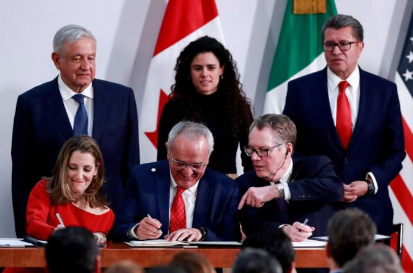The revamped trade pact between the United States, Canada and Mexico, taking effect on Wednesday, was meant to create a kind of fortress North America, boosting the region’s competitiveness – but cracks are already starting to show in the foundation.
SEE ALSO: Trump Says China Deal ‘Fully Intact’ After Navarro Roils Markets
As the deal kicks in, the Trump administration is threatening Canada with new aluminium tariffs, and a prominent Mexican labour activist has been jailed, underscoring concerns about crucial labour reforms in the replacement for the 26-year-old North American Free Trade Agreement.
The risk of disputes among the three trading partners is growing, analysts say.
The U.S.-Mexico-Canada Agreement includes tighter North American content rules for autos, new protections for intellectual property, prohibitions against currency manipulation and new rules on digital commerce that did not exist when NAFTA launched in 1994, an agreement U.S. President Donald Trump has lambasted as the “worst trade deal ever made”.
The coronavirus has all three countries mired in a deep recession, cutting their April goods trade flows – normally about $1.2 trillion annually – to the lowest monthly level in a decade.
“The champagne isn’t quite as fizzy as we might have expected – even under the best of circumstances – and there’s trouble coming from all sides,’’ said Mary Lovely, a Syracuse University economics professor and senior fellow at the Peterson Institute for International Economics in Washington.
“This could be a trade agreement that quickly ends up in dispute and higher trade barriers.’’
Issues dogging USMCA include hundreds of legal challenges to Mexico’s new labour law championed by President Andres Manuel Lopez Obrador to ensure that workers can freely organise and unions are granted full collective bargaining rights.
A ruling against it would harm Mexico’s ability to deliver on provisions aimed at ending labour contracts agreed without worker consent that is stacked in favour of companies and has kept wages chronically low in Mexico.
Democrats in the U.S. Congress had insisted on the stronger labour provisions last year before granting approval, prompting a substantial renegotiation of terms first agreed in October 2018.
The arrest of a Mexican labour lawyer, Susana Prieto, in early June has fuelled U.S. unions’ arguments that Mexican workers’ rights are not being sufficiently protected.
“I remain very concerned that Mexico is falling short of its commitments to implement the legislative reforms that are the foundation in Mexico for effectively protecting labour rights,’’ U.S. Representative Richard Neal, Chairman of the House Ways and Means Committee, said on Tuesday.
Neal added that USMCA’s success “truly hinges” on its new labour enforcement mechanism.
U.S. Trade Representative, Robert Lighthizer, has said he will file dispute cases “early and often” to enforce USMCA provisions, citing Mexico’s failure to approve U.S. biotech products.
That could lead to increased tariffs on offending goods, such as products from individual factories where labour violations are found.
Carlos Vejar, a former Mexican trade negotiator, said it was in the country’s interest to uphold pledges made to strengthen unions and end child labour.
“If Mexico isn’t mindful of this, there will be cases against Mexico, and Mexico will lose them,’’ Vejar said.
U.S. national security tariffs on imported steel and aluminium – including from Canada and Mexico – were a major irritant during USMCA negotiations until a deal for exemptions was reached last year.
But now, USTR is considering domestic producers’ request here to restore the 10 per cent duty on Canadian aluminium to combat a “surge” of imports across the northern border.
Canadian Prime Minister Justin Trudeau on Monday told reporters that these would hurt both countries and raise materials costs for U.S. manufacturers.
Another source of disputes could be the energy sector, where the main U.S. oil and gas lobby has already complained that recent actions by Mexico favouring state oil company Pemex violate protections for private investors carried over from NAFTA.
Canada has also complained about new Mexican rules formally threatening investment in renewable energy.
USMCA will put new compliance burdens on the region’s automotive manufacturers as the coronavirus craters consumer spending and auto production.
Within three to five years, vehicles’ minimum North American content rises to 75 per cent from 62.5 per cent.
Automakers must also produce 40 per cent of their vehicles’ content in “high wage” areas – effectively the U.S. and Canada.
A U.S. International Trade Commission study found this would draw more auto parts production to the U.S., but may curb U.S. vehicle assembly and raise prices, limiting consumer choice in cars.
The same panel found that after 15 years, the deal would add $68.5 billion annually to U.S. economic output and create 176,000 jobs compared with a NAFTA baseline.

